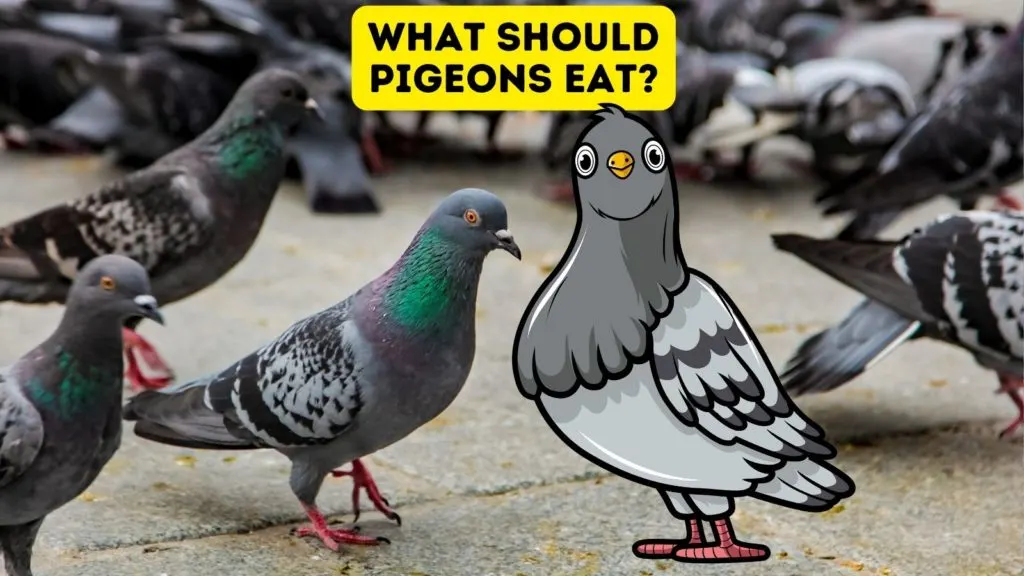Often seen fluttering around in parks and city streets, pigeons are a familiar sight in most cities and parks, often scavenging for food or being fed by fellow bird lovers. But have you ever wondered what these wild pigeons should be eating? Whether you’re observing them from your backyard or encountering them on your daily errands, understanding their diet is key to supporting their health and well-being.

Natural Diet of Wild Pigeons
Pigeons, ubiquitous city dwellers and countryside inhabitants, require a balanced diet to maintain their health and vitality. Pigeons are granivorous creatures, meaning their natural diet primarily consists of seeds and grains, but pigeons might encounter a wider variety of foods, not all of which are beneficial for them.
In the wild, pigeons forage for a variety of seeds, which provide the essential nutrients they need to thrive. When you feed pigeons, it’s important to replicate this natural diet as closely as possible.
A mix of grains, including wheat, barley, and corn, can serve as a staple for their meals. Additionally, small amounts of greens and fruits can be included to add variety and essential vitamins to their diet, ensuring they receive a comprehensive range of nutrients.
What’s fascinating is how their diet changes with the seasons, switching between different seeds and fruits as they become available.
Contrast this with urban pigeons. The city life has changed their eating habits quite a bit. Often, they’re seen pecking at whatever leftovers they find, but this isn’t always the best for them. It’s a far cry from the diverse and nutritious diet they have in the wild. That’s where we, as bird enthusiasts, can play a role.
If you’re thinking of feeding pigeons while you’re out and about, it’s great to stick to foods that mimic their natural diet. Think seeds, grains, and the occasional fruit.
Here’s a quick tip: scatter the food to encourage foraging behavior, which is a healthy, natural activity for pigeons. It’s a more natural activity for the pigeons to forage for seeds all around your bird feeding area rather than finding a pile of seeds in one ground feeder.
Let’s look closer at the pigeon’s dietary needs and how we can help out!
What Foods Can You Feed Pigeons?
Pigeons require a balanced diet to maintain their health. Although they may eat many things in their foraging, you can help out by feeding them a variety of seeds, fruits and vegetables, and high-quality commercial feeds. Typically pigeon food consists of Grains (50%), Legumes (30%) and Seeds & Nuts (20%).
Seeds and Grains
Pigeons thrive on a mixture of seeds and grains as the core of their diet. Offer:
- Millet
- Corn
- Wheat
- Barley
These should be given raw and unprocessed to ensure natural nutrition.
Fruits and Vegetables
Include a variety of fresh fruits and vegetables to ensure a balanced intake of vitamins and minerals. (Avoid avocados and onions as they can be toxic to pigeons.) Suitable options include:
Commercial Pigeon Feeds
For a complete nutritional profile, incorporate commercial pigeon feeds that are specifically formulated to meet their needs. Look for brands offering:
- Pellets or mixed seeds
- Essential vitamins and minerals
These feeds are designed to supplement natural feeding habits and support pigeons’ health.
Also, you can adjust your offerings by season. In the winter, offer higher fat content for warmth; in the summer, feed pigeons lighter foods that are rich in hydration (such as many fruits and vegetables).

Foods to Avoid Feeding Pigeons
Although wild pigeons will forage through trash and discarded foods, it’s important not to add to that by offering foods they might harm their health. Below are specific foods that you should never feed to pigeons:
Toxic Foods
Pigeons can be poisoned by a number of toxic substances that are commonly found in some plants and human foods. Avoid these at all costs:
- Avocado: Contains persin, which is toxic to pigeons.
- Caffeine: Found in coffee, tea, and soda; can cause cardiac distress.
- Chocolate: Contains theobromine, which is lethal to birds.
- Salt: Excessive amounts can lead to dehydration and kidney dysfunction.
- Alcohol: Can lead to potential fatal intoxication.
- Apple seeds and certain other fruit pits or seeds: Can contain cyanide, which is toxic to pigeons.
Junk Food and Human Snacks
Pigeons should not be fed human junk food and snacks, as these can be unhealthy and lead to malnutrition:
- Sugary foods: Can cause obesity and does not provide nutritional value.
- Fatty foods: High-fat content is not suitable for pigeons’ dietary needs.
- Salty snacks: Can disrupt their fluid balance and cause excessive thirst or dehydration.
- Processed foods: Often contain a range of chemicals and preservatives that may harm pigeons.
Dairy Products
Lactose found in dairy products is not easily digested by pigeons:
- Milk: Can lead to indigestion and diarrhea.
- Cheese: Hard for pigeons to digest and offers no nutritional benefit.
- Ice cream: Besides lactose, the high sugar content is also inappropriate for pigeons.
Essential Nutrition for Pigeons
Pigeons require a balanced diet consisting of specific nutrients for optimal health, including proper macronutrients, a range of vitamins and minerals, and adequate water intake.
Macronutrients
Pigeons need the right balance of proteins, fats, and carbohydrates for energy, growth, and maintenance. Generally, a pigeon’s diet should contain:
- Proteins: Essential for growth and repair of body tissues. Aim for a protein content of 16-18% in their feed.
- Fats: Provide energy and help absorb vitamins. They should be around 4-5% of the diet.
- Carbohydrates: Pigeons’ primary energy source, often from grains and seeds.
| Nutrient | Percentage | Sources |
|---|---|---|
| Proteins | 16-18% | Legumes, peas, canary seed, soybeans |
| Fats | 4-5% | Oilseeds, nuts, sunflower seeds |
| Carbohydrates | 50-60% | Corn, wheat, barley, rice |
Vitamins and Minerals
Pigeons require a range of vitamins and minerals to maintain their health, including but not limited to:
- Calcium and Phosphorus: For strong bones and overall health.
- Vitamins A, D, E, and K: Necessary for vision, bone health, antioxidant properties, and blood clotting, respectively.
Water Requirements
All wild birds need water, year around. The amount they drink can vary due to temperature and diet, but as a guideline:
- Adult pigeons will drink approximately 50 ml (almost 3 tablespoons) of water daily.
- High temperatures or a diet high in dry seeds may increase water intake.
| Factor | Water Intake Influence |
|---|---|
| Adult pigeon | ~50 ml/day |
| High temperature | Increased intake |
| Dry seed diet | Increased intake |
Pigeons also use water for bathing, which is crucial for feather maintenance.
Offering a bird bath in your backyard will be a welcome asset for pigeons as well other wild birds! If you can continue to offer water during freezing weather, either by taking out tepid water or installing a bird bath heater, your bird bath will be very popular!
A Note on Responsibility
As much as we enjoy helping our feathered friends, it’s crucial to remember that pigeons are wild birds. While it’s okay to offer them appropriate snacks, we should avoid making them dependent on human-provided food. Encouraging their natural foraging habits is best for their health and maintains the natural balance in our shared environment.
Next time you’re out and spot a pigeon, remember that a little bit of the right food goes a long way. By understanding and respecting their dietary needs, we contribute to their well-being and enjoy their presence in a responsible, loving way.
More Posts You Might Like
- 8 Letter Bird Names - August 14, 2024
- 7 Letter Bird Names - August 14, 2024
- 7 Birds Named After Famous People - July 23, 2024
